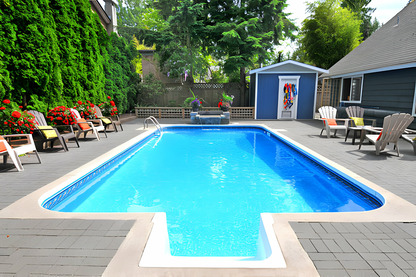
Welcome to the ultimate guide on how to keep your swimming pool clean and green using simple and eco-friendly methods! Taking care of your pool doesn’t have to mean using harsh chemicals that can harm the environment. In this guide, we’ll explore easy and green ways to maintain a sparkling pool that’s safe for both swimmers and nature.
Imagine a pool where the water is crystal clear, and you’ve achieved it without harming the environment. We’ll show you how to use natural sanitizers like saltwater systems and purification methods with UV-C and ozone. Say goodbye to strong chemicals by using enzyme-based cleaners and beneficial microorganisms. To save water, we’ll cover efficient circulation, monitoring water levels, and even using rainwater for refilling. And when it comes to tools, think about eco-friendly brushes, solar-powered vacuums, and biodegradable nets. Transform your pool into a refreshing oasis while being kind to the planet with our simple and green pool-cleaning guide!
See also our post on Green Cleaning for Baby’s Room: Safe and Non-Toxic Solutions
The Impact of Traditional Pool Cleaning
1. The Environmental Toll of Conventional Pool Chemicals
Traditional pool cleaning chemicals often contain harsh substances that can harm aquatic ecosystems. Understanding the environmental toll of these chemicals is the first step toward adopting greener alternatives.
2. Impact on Pool Water Quality
Over-reliance on chlorine and other chemical sanitizers can lead to imbalances in pool water chemistry. This not only affects the health of swimmers but also necessitates frequent chemical adjustments, contributing to water waste.
3. Negative Effects on Pool Infrastructure
Harsh chemicals can accelerate wear and tear on pool infrastructure. This includes damage to pool liners, filters, and other components, leading to increased maintenance costs and resource consumption.
4. Chlorine Byproducts and Health Concerns
Chlorine byproducts, such as chloramines, pose health risks to swimmers and pool operators. These byproducts can cause respiratory issues and skin irritation, emphasizing the need for a more sustainable and health-conscious approach.
5. Impact on Aquatic Life
If pool water is discharged into natural water bodies, the chemicals used can harm aquatic life. Green cleaning practices aim to minimize this impact, ensuring that pools contribute positively to the environment.
Eco-Friendly Pool Chemistry
Natural Sanitizers: The Rise of Saltwater Pools
Saltwater pools have gained popularity as a greener alternative to traditional chlorinated pools. Saltwater systems use electrolysis to generate chlorine, reducing the need for chemical additives and providing a gentler swimming experience.
UV-C and Ozone Purification
UV-C and ozone purification systems are effective in eliminating contaminants without the need for excessive chemical use. These systems harness the power of ultraviolet light and ozone to keep pool water clean and clear.
pH Balancers Derived from Natural Sources
Maintaining optimal pH levels is crucial for pool water balance. Eco-friendly pH balancers derived from natural sources, such as baking soda, offer a sustainable alternative to chemical-laden solutions.
Enzyme-Based Pool Cleaners
Enzyme-based pool cleaners break down organic matter, reducing the need for heavy chemical doses. These cleaners are biodegradable and provide a gentle yet effective approach to pool maintenance.
Beneficial Microorganisms for Natural Filtration
Introducing beneficial microorganisms to your pool can enhance natural filtration processes. These microorganisms help break down organic debris, promoting water clarity and reducing the need for chemical interventions.
Sustainable Water Conservation Practices
Efficient Water Circulation and Filtration
Optimize pool circulation and filtration systems for efficiency. Proper water circulation ensures that all areas of the pool receive adequate filtration, minimizing the need for excessive chemical treatments.
Regular Monitoring of Water Levels
Regularly monitor water levels to prevent unnecessary water waste. Maintaining the correct water level ensures efficient skimming and filtration, reducing the need for additional water additions.
Rainwater Harvesting for Pool Refilling
Consider rainwater harvesting as a sustainable source for pool refilling. Collecting rainwater reduces reliance on treated water sources, conserving resources and minimizing the environmental impact of pool maintenance.
Pool Covers for Evaporation Prevention
Use pool covers to prevent evaporation. Covering your pool when not in use reduces water loss due to evaporation, conserving water and minimizing the need for frequent refilling.
Water Recycling and Reuse Systems
Implement water recycling and reuse systems. These systems filter and purify pool water, allowing for its reuse in irrigation or other non-potable applications, promoting a closed-loop approach to water conservation.
See also our post on Green Cleaning for Outdoor Windows: Crystal Clear and Eco-Friendly
Eco-Friendly Pool Cleaning Tools and Accessories
Environmentally Friendly Pool Brushes and Nets
Invest in pool brushes and nets made from sustainable materials. Eco-friendly pool cleaning tools ensure that your maintenance practices align with green principles while effectively removing debris from the pool.
Solar-Powered Pool Vacuums
Solar-powered pool vacuums harness energy from the sun to operate, reducing the reliance on electricity. These vacuums offer an eco-friendly solution for keeping pool bottoms free from dirt and debris.
Biodegradable Pool Skimmer Nets
Opt for biodegradable pool skimmer nets. These nets break down naturally over time, reducing the environmental impact of discarded pool cleaning tools.
Eco-Friendly Pool Cleaning Solutions
Explore eco-friendly pool cleaning solutions. Brands that prioritize natural, biodegradable ingredients provide effective alternatives to traditional chemical-laden pool cleaning products.
Sustainable Pool Storage Solutions
Store pool cleaning tools and accessories in sustainable containers. Use recycled or upcycled materials for storage to minimize the ecological footprint of your pool maintenance routine.
Green Landscaping Practices Around the Pool
Native Plants for Poolside Landscaping
Choose native plants for poolside landscaping. Native vegetation requires less water and maintenance, contributing to a sustainable and visually appealing pool environment.
Rain Gardens for Water Absorption
Incorporate rain gardens around the pool area to absorb excess water runoff. Rain gardens enhance water absorption, reduce soil erosion, and create a natural and sustainable landscape.
Permeable Pool Deck Surfaces
Consider permeable pool deck surfaces to allow water penetration. Permeable materials prevent water runoff, promote natural groundwater recharge, and contribute to sustainable poolside landscaping.
Eco-Friendly Pest Control
Implement eco-friendly pest control measures. Avoid chemical pesticides that can contaminate pool water. Instead, opt for natural alternatives that do not pose a threat to water quality.
Mulching for Soil Moisture Retention
Apply mulch around pool landscaping to retain soil moisture. Mulching reduces the need for excessive watering, conserving water and promoting a sustainable approach to poolside greenery.
See also our post on Green Cleaning for Camping Cookware: Eco-Friendly Outdoor Meals
Conclusion
Choosing eco-friendly pool maintenance techniques not only allows you to enjoy a refreshing swim but also makes a positive impact on the environment. Let this comprehensive guide serve as your road map for creating a pool oasis where clear waters and green principles coexist harmoniously, providing a swim experience that is both enjoyable and environmentally responsible. Green cleaning for your swimming pool is more than just a fad; it is a commitment to a sustainable aquatic lifestyle.







